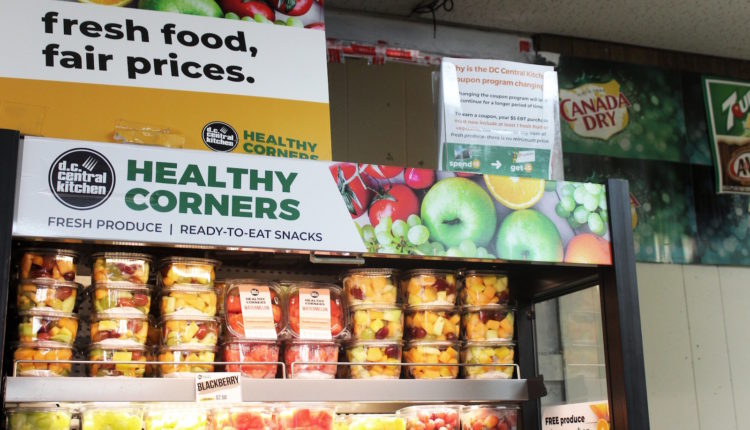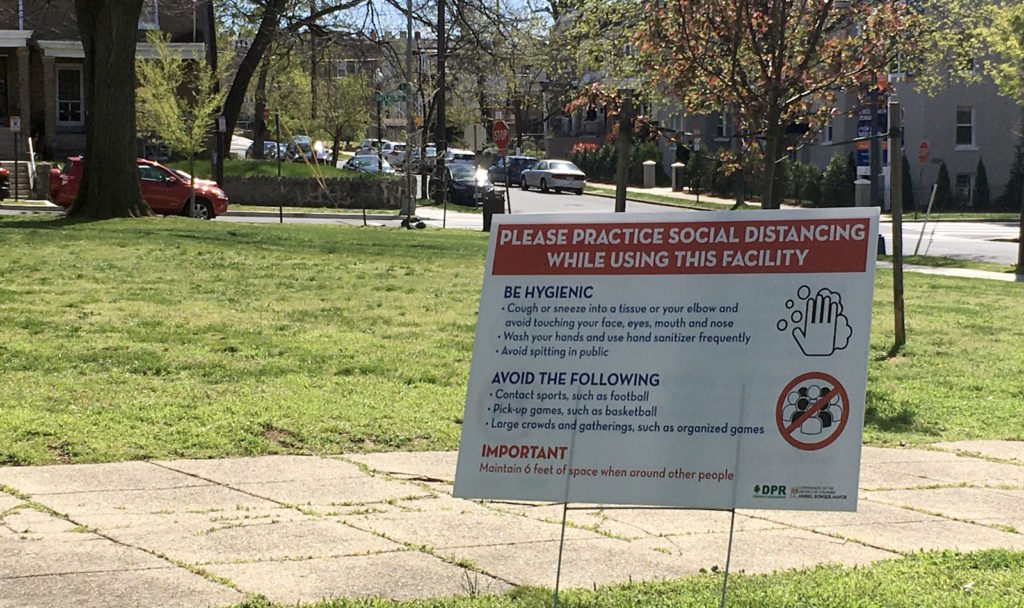
The DC Lineup was created to build community within the District. We’re a citywide news source that highlights neighborly events like PTA meetings and community festivals.
During the second week of March, our initial list of things to do that weekend dramatically changed as many of the events we had planned to highlight were canceled due to growing concern about the novel coronavirus. Since then, our Lineup has become a place to share information to help our readers find a sense of community while navigating the ongoing pandemic.
We thought it would be useful to compile an archive of resources related to the COVID-19 situation in DC. Our regular Lineup will continue to include recreational items to help folks pass the time as they stay at home. Here’s where you’ll find the practical stuff: mostly essential needs and a few fun extras — namely which local eateries deliver ice cream and cookies.
This is a growing list that we intend to add to, and we invite the public to share anything more we ought to include.

Community
- Essential Needs: The DC government’s official coronavirus website covers a wide variety of topics, such as unemployment insurance and available food resources (more details on food are listed below). The site also clarifies new regulations — for instance, which businesses are allowed to remain open despite the stay-at-home order. In addition, the site provides COVID-19 data, including the number of virus-related deaths in DC and how many people have recovered and have tested positive. As of April 20, there were 112 deaths, 636 recoveries and 3,098 positive tests.
- Essential Needs: HopeOneSource provides “social technology for good” with its texting and emailing platform that reaches nearly 2,700 DC residents who are experiencing housing instability and have signed up for the messages. In light of the pandemic, HopeOneSource created a spreadsheet with details about the current operations of service providers like Bread for the City and Everyone Home DC. The organizations that are listed help fill essential needs like shelter, food, restrooms, showers, clothing and haircuts, as well as career, social service, housing and medical assistance. Many of these organizations have opted into HopeOneSource’s text and email service, which will alert users about nearby options. Directions to sign up for the text and email service are here.
- Essential Needs: The DC Mutual Aid Network maintains a Facebook group and a spreadsheet with information about how community members can help one another. The spreadsheet highlights resources in specific wards and neighborhoods, as well as groups with particular areas of focus like supporting people with disabilities or getting protective gear to those who need it. The document also includes information about food delivery and other errands, child care, translators, access to hygiene products, health, fundraising, policy initiatives and volunteer opportunities.
- Essential Needs: Free Wi-Fi is available at these hot spots in the District. Many are outdoors, providing a safe way to maintain physical distance while connecting digitally.
- Transportation: The Washington Metropolitan Area Transit Authority lists COVID-19 service information for Metrorail and Metrobus, including details about the reduced schedule. There’s also a notice that customers should wear cloth face coverings or homemade masks while riding public transportation as well as in transit facilities like stations and bus terminals. Metro notes that while face coverings are strongly encouraged, no one will be denied service if they are not wearing one.
- Education: DC Public Schools lists coronavirus updates about the revised calendar (distance learning will continue for the rest of the school year, which will end early on May 29) and meal sites (DCPS is still distributing meals for students at sites across the District on weekdays). Resources for families, like tips for getting the most out of distance learning, are also included.
Health
- Testing: The DC government lists area COVID-19 testing sites such as United Medical Center, Children’s National Hospital, George Washington University Hospital, Kaiser Permanente and MedStar Health. Additionally, Whitman-Walker Health and One Medical are offering on-site tests, symptomatic treatment, self-care tips and televisits.
- Safety: Local hotlines like DC Safe (1-844-443-5732) and My Sister’s Place (202-540-1064) encourage those experiencing domestic violence to reach out to them for free and confidential support.
- Mental Health: For anyone feeling overwhelmed by the health crisis, the DC Department of Behavioral Health Access HelpLine (888-793-4357) connects callers with trained professionals, referrals to mental health providers, and on-call mobile crisis teams that directly respond to handle psychiatric or emotional emergencies.
- Recovery: Though 12-step programs are no longer meeting in person, there are still opportunities to connect to manage addiction and recovery. The Washington Area Intergroup Association of Alcoholics Anonymous highlights its telephone hotline (202-966-9115) as well as Zoom group meetings. The Chesapeake & Potomac Region of Narcotics Anonymous lists a few of its meetings that are now virtual.
Food
- Essential Needs: The DC government highlights which grocery stores are open early just for seniors; a map that highlights grocery stores and free food resources throughout the District; the expanded list of food eligible for purchase via DC’s Special Supplemental Nutrition Program for Women, Infants and Children (WIC); and an updated list of farmers markets that have been approved for operation during the pandemic. People who are homebound because of COVID-19 can also obtain help from the District in obtaining food and other essentials by calling 1-888-349-8323 or visiting coronavirus.dc.gov/gethelp; workers will refer those who are not eligible to groups or programs that may be able to provide assistance.
- Essential Needs: The Capital Area Food Bank handles the Commodity Supplemental Food Program (known as Grocery Plus), which supports individuals over 60 years of age who have limited income. The DC government notes that Grocery Plus has increased distribution to at-home seniors and that those who haven’t received their monthly food box should contact the Capital Area Food Bank at 202-644-9880. An interactive map highlights the food bank’s COVID-19 community hub partners, food distribution partners and school meals distribution sites.
- Essential Needs: DC Central Kitchen’s Healthy Corners program sells fruits and vegetables at below-market prices. As part of the group’s COVID-19 response, it has reduced prices up to 50% on its already discounted produce at dozens of participating stores.
- Essential Needs: The DC Food Project lists locations where bags of groceries are available for pickup at no cost, courtesy of DCPS Grocery Distribution Sites and Martha’s Table. The site also includes restaurants and food banks that are distributing free food.
- Essential Needs: The Facebook group DC-Area COVID-19 Grocery Getters matches volunteers with the most vulnerable people in our community who are unable to venture out themselves to buy groceries.
- Essential Needs: The DC Department of Human Services has made it easier to apply for public benefits by combining the applications for SNAP (Supplemental Nutrition Assistance Program) with medical and financial assistance. The combined application is here.
- Restaurants: Eater DC provides information about local restaurants that have morphed into grocery stores and highlights establishments that are offering delivery — including some that will bring cookies and ice cream to your door. Barred in DC also has a variety of lists about local bars selling to-go items and hosting online events such as virtual trivia.
News
- Information: Local news outlets across the District are providing valuable coverage of the impact of the pandemic on the city. Coronavirus updates are highlighted on the web pages of Washingtonian, WAMU and WTOP, as well as the local TV stations. COVID-19 guides can be found in both DCist and City Paper; The Washington Post has lifted its paywall on its local, national and global coronavirus coverage, and it sends out a daily newsletter about the public health crisis. Our own District Links newsletter also includes updates from the mayor’s regular briefings and an overview of local news coverage.
- Education: For professional and citizen journalists alike, the DC-based organization International Center for Journalists has organized resources to assist in COVID-19 coverage, including a Facebook group and webinars. The Associated Press has created a Coronavirus Topical Guide to clarify proper style and usage.
What else should we include? Let us know by emailing news@thedcline.org.


Comments are closed.